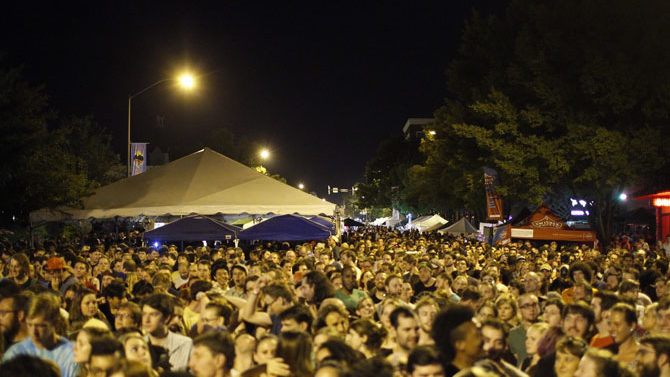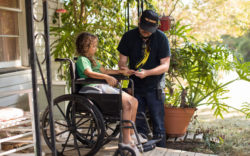The group sat upstairs at the former Athens Brewing Co. and faced a deadline: It was six weeks until Athens’ first downtown music festival. Could they pull it off?
They decided to jump. And in July 1997, with some sound equipment set up on the steps of the courthouse on Washington Street, AthFest was born.
Today, that homegrown festival encompasses about 40 bands among three professionally produced stages on the other side of downtown, plus a nighttime club crawl and various spinoff events throughout the weekend. But despite all its growth, one thing hasn’t changed in its 20-year history: the festival’s shoestring budget.
“Where we can put in new revenue streams, we do,” says Jill Helme, executive director of AthFest Educates, the music and arts education nonprofit that now puts on AthFest. This year’s projected budget for the festival, for example, calculates a net loss of more than $12,000, even including new ideas such as selling special beer mugs, which netted the organization $6,000 last year, as well as a $5,000 grant from the Georgia Council for the Arts.
“Last year one of our board members had the idea of doing the beer mugs; they sold out on Friday night in a couple hours,” says Helme. “So we were like, ‘OK, we’ll do that again this year.’ And that was an additional $3,000. So it’s those kind of things—but they are these tiny merchandise options. We don’t have the grand-scale solution.”
This has led organizers to wonder, is it even worth putting on AthFest anymore, if it’s not pulling in money for its parent nonprofit’s mission?
Jeff Montgomery, the public information officer for Athens-Clarke County, was among those who attended the first planning meetings for AthFest 20 years ago. He recalls a similar struggle to turn a profit, even in the early days. “Some years we did really well and had a surplus, and some years we got really close, and other years we lost some,” he says. “But it all went back into the festival one way or another. There was a sense that, ‘Hey, if we made some seed money it gives us a chance to… produce the CDs earlier. Or maybe now we can have two stages, so we can do some more and hopefully draw more people.’”
These days it’s the AthHalf half marathon that brings in the most money for AthFest Educates, and the focus of the festival has widened in the process. Originally started to bring people downtown during a particularly dead time of year, today the music festival aims to do that, while also showcasing local music, educating the general population about music and the arts and maybe—maybe—bringing in some money for AthFest Educates.
Bringing People Downtown
Art Jackson, who was director of the Athens Downtown Development Authority when AthFest first kicked off, says that, at the time, many businesses were still reeling from the empty promises of the Olympics. In 1996, Athens was told crowds of international visitors would come to watch soccer and gymnastics events, eager to eat Southern barbecue and shop in local stores. But that’s not what happened.
“We had great expectations of people from all over the world. But it was a sporting event, and I’d say 90 percent of the people came from the Southeast,” he says. So when a group of people involved in the local music scene began talking about putting together a festival, Jackson connected it to downtown businesses.
“From my perspective, in the summertime, it was really slow,” he says, noting that at the time the University of Georgia was on a quarter system. “Helping downtown was part of [the festival]. Another part was trying to reclaim Athens as a music center. So the people, they said, ‘Yes, it’s time to do this.’ And it was for downtown, and that allowed me to be involved.”
But holding a festival downtown comes with its caveats. There are certain expenses that go along with closing downtown streets, such as paying for lost parking-meter revenue, electricity and a police presence. And per city rules, if your event takes place in a public street, it cannot be a ticketed event. To offset these expenses, AthFest added new features over the years. For example, the post-festival Club Crawl adds more than $50,000 to the budget through wristband and ticket sales at downtown music venues. And the addition of beer tents and commemorative glasses brings in another $25,000.
But with a mission to bring people downtown to spend money in local shops and restaurants, a revenue stream from beer sales becomes a double-edged sword. When concertgoers sip beers in the festival’s beer garden, they’re supporting AthFest Educates. When they sip a beer in the courtyard at Ted’s Most Best just a few yards away, they’re supporting a local business. Neither one is a wrong decision—but is the model sustainable?
Bringing New Fans to Musicians
Along with bringing people downtown, AthFest organizers agreed that the festival should also be a showcase for Athens music. At the time, large-scale outdoor festivals in the United Kingdom inspired festivals across the United States—brands such as Lilith Fair, the Warped Tour and Lollapalooza. If Athens were to host its own festival, it would be about promoting music from the Athens region. This aspect was non-negotiable, according to many associated with the festival.
“The focus has always been on Georgia and Athens bands, and we don’t want to stray from that,” says The Foundry’s Troy Aubrey, who has booked bands for AthFest since its third year. “People have [asked], ‘Why don’t you get big national acts?’ But why should we? It’s called AthFest. This is about showcasing the acts that are here and living and working and breathing in Athens.”
Aubrey has watched as the festival evolved and the crowds grew. In the early years, the stage was the courthouse steps, along with a 10-by-10-foot pop-up tent with a small amp for solo or acoustic artists. “That was where John Mayer played for $100, before anybody knew who he was,” he says.
“But it’s definitely evolved into a huge family event. I bring my kids down there. [KidsFest] has really grown to be this bigger part of AthFest. And it’s become more important to me as I have two kids. I can see the value of growing that part of the festival.”
This is where AthFest plugs into its current mission of being an educational tool. Helme says the mission of AthFest Educates is to support the community and youth access to art and music education. “And one of the ways we do that is provide a music and arts festival,” she says. “So AthFest is an educational component in what it gives back to the community.”
Montgomery acknowledges that, over the years, some have questioned whether the festival should aim for bigger crowds by bringing in larger national acts. But to him and Aubrey, the educational component is specifically learning about Athens music. Aubrey describes the club crawl as a “crash course” in local bands; Montgomery recalls a time years ago when Japancakes played on the main stage while parents arrived to pick up their kids, members of a Boy Scouts troop working the beverage tent.
“All these middle-aged parents were coming up and asking, ‘Who is this?’” he says. “They ended up buying CDs, but they never would have heard of this band otherwise. AthFest educated them on the music. We were really educating the Athens community on the local music scene from the beginning, so some of those things are free for people to come down and see bands they wouldn’t see otherwise.”
A bigger budget could potentially draw some bigger names, adds Helme, but that’s not the point. Sure, every band gets some sort of compensation—that was part of AthFest from the beginning—but it’s more about showcasing the local talent. “We would love to have our band budget bigger, but it’s still regional. The whole focus of AthFest is celebrating our local and regional talent,” she says. “We’re not striving to be a Bonnaroo or Coachella; that’s not the goal in any way, shape or form.”
That’s another reason why Helme says charging admission to AthFest is a non-starter. A ticketed event means not everyone has the means to go, and the point of AthFest is to showcase the music to everyone. Moving the festival to a park outside of downtown would allow for ticketing, but would also change the vibe of the event. From the perspective of AthFest Educates, the festival is helping to fulfill an educational component by giving back to the community.
“Ultimately, the largest part of our funding comes from the half marathon,” Helme says. “In a good year, in the best of years, we hope that we at least break even. So we do want the festival to be a fundraiser for AthFest Educates, but the larger impact of the festival is the educational component for all ages.”
Bringing Focus to the Festival
Paul Jamieson is executive director of SunFest, a music and arts festival that takes place in downtown West Palm Beach, FL. Like AthFest, the 30-year-old festival began as a way to bring people to downtown West Palm Beach and fill hotel rooms. But over the course of SunFest’s history, it’s seen a transformation in its lineup and its focus. For example, in the late 1990s performers included Kenny G, Patti LaBelle and Little Feat. This year, headliners included Duran Duran, Alabama Shakes, Death Cab for Cutie and Rick Springfield.
What changed? “What worked for SunFest was we needed to focus,” he says. “We were created for economic impact, and we’re a music festival. And in order to compete, we needed to up our game, talent-wise.”
In his decades working in the festival industry, this is the one mistake he says he sees festivals and fairs make. SunFest was lucky, he notes, because it was around for about a decade before outdoor concerts really took off, giving them time to work out the kinks and figure out who they wanted to be. But Jamieson has also consulted with events around the country, and time and again, it’s a lack of focus that makes the event a struggle. “Nobody’s wrong—the beauty of a festival is there’s no right or wrong way,” he says. “But first they need to make a decision. Set a priority.”
Even though SunFest charges admission to the five-day festival—ranging from $35–$90—Jamieson says because the organization is a nonprofit, they keep ticket prices as low as possible. But being able to charge admission does change the dynamics of a show and has an obvious effect on an event’s bottom line. That said, other veteran concert promoters interviewed for this story agree it is possible to make money off a free outdoor festival, but what turns a profit in that case is merchandise, food and drink sales. For example, several free outdoor concerts in Atlanta work because they are located in a city park, and attendees buy food and drinks at the event. But AthFest’s location downtown, amid bars and restaurants that are supposed to be benefiting from the crowds, complicates that aspect.
Jamieson points to Musikfest, a music festival in Bethlehem, PA, that has both free and ticketed areas. More than 500 bands perform on a free stage, while an adjacent downtown park hosts headliners for the ticketed portion of the festival.
Aubrey says his current strategy is to schedule some bigger-name acts earlier in the evening to bring people out for more of the show. “I have bigger bands starting earlier in the day; the goal is to get more people down there earlier,” he says. “We’re constantly looking to get certain audiences out there earlier in the day—that’s always a goal. And we’re working with the 40 Watt to produce wristband-only shows. That’s something where we’re able to get bigger acts.”
Right now, no one can predict whether this will give a boost to downtown. The one unknown in all of AthFest’s history is the actual economic impact it has on downtown businesses, Helme says. Nobody has done a study, and with more than 15,000 UGA students taking classes over the summer, downtown is not as dead in June as it once was.
It’s $5,100 to hire the UGA Terry College of Business as a consultant to figure that out, says Helme. She’s asked the ADDA—which already subsidizes AthFest to the tune of $10,000—for help, but the authority is waiting until the end of the fiscal year to see how much money it has. It’s hard for AthFest Educates to justify that expense, Helme says, when the festival isn’t consistently turning a profit.
“But those are the things where we can turn around and say, ‘This is what we’re giving back to the city in terms of tax revenue,’” she says. “There a lot of money that we pay out to the city—barricades, electrical, police, parking. But there’s a cost to them, too. I understand the city can’t give it to you for free, but it would be nice to say, ‘See how much revenue we’re bringing in?’”
Like what you just read? Support Flagpole by making a donation today. Every dollar you give helps fund our ongoing mission to provide Athens with quality, independent journalism.









